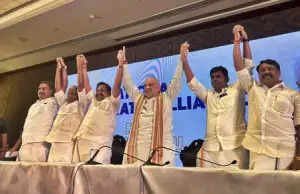Amit Shah Declares AIADMK as NDA Leader in Tamil Nadu: What This Means for 2026 Elections
AIADMK Takes the Helm in NDA for Tamil Nadu

Chennai: On Friday, Union Home Minister Amit Shah officially announced that the All India Anna Dravida Munnetra Kazhagam (AIADMK) will spearhead the National Democratic Alliance (NDA) in Tamil Nadu, paving the way for a collaborative campaign in the upcoming 2026 Assembly elections.
During a press briefing in Chennai, Shah characterized the alliance between AIADMK and BJP as a 'natural partnership' and confirmed that Edappadi K. Palaniswami (EPS), the general secretary of AIADMK, will be the NDA's candidate for chief minister in the state.
This announcement signifies a notable political shift, reviving a partnership that had disintegrated in September 2023 due to a contentious fallout.
The split was primarily instigated by remarks from Tamil Nadu BJP president K. Annamalai, which were deemed offensive by AIADMK leaders.
His comments regarding respected Dravidian figures like C.N. Annadurai and J. Jayalalithaa incited outrage within the AIADMK, leading to a public divide between the two parties.
Previously, the two parties had collaborated in the 2019 Lok Sabha and 2021 Assembly elections.
In the 2021 elections, the BJP secured four seats while the AIADMK won 66.
However, relations deteriorated following Annamalai's appointment as the state BJP chief, culminating in the alliance's collapse ahead of the 2024 Lok Sabha elections.
This division proved detrimental, as both parties faced significant losses in the 2024 elections.
Amit Shah arrived in Chennai early Friday and was welcomed at the airport by prominent BJP leaders, including state president K. Annamalai, Union Minister of State L. Murugan, and senior figures such as Tamilisai Soundararajan, Nainar Nagendran, and Pon Radhakrishnan.
During his visit, Shah engaged in vital discussions with senior BJP and RSS leaders, including a private meeting with S. Gurumurthy, editor of Thuglak magazine and a key RSS ideologue.
These discussions were part of a strategic effort to restore the alliance ahead of the 2026 elections.
Political analysts note that the groundwork for this reunion had been laid weeks prior. EPS, along with senior AIADMK leaders and former ministers S.P. Velumani and K.P. Munusamy, had met with Shah in New Delhi, which fueled speculation about a potential reconciliation.
Sources indicate that AIADMK leaders urged the BJP high command to consider replacing K. Annamalai to ease tensions between the two parties.
In a noteworthy development, Annamalai announced on April 4 that he would not pursue any official position within the party and would remain a loyal cadre, a statement that may have facilitated renewed negotiations.
Senior RSS officials reportedly played a crucial role in mending the alliance, encouraging the BJP central leadership to strengthen ties with a significant Dravidian party.
With the DMK viewed as a political rival, the AIADMK stands out as the only feasible option for the BJP to regain influence in Tamil Nadu. This announcement is anticipated to trigger a substantial realignment in the state's political landscape.
With nearly a year remaining until the 2026 Assembly elections, both parties are expected to initiate groundwork for campaign coordination, candidate selection, and constituency-level strategies.
The revived alliance could significantly alter the electoral dynamics in Tamil Nadu as the NDA seeks to position itself as a formidable contender against the ruling DMK.
Political experts believe that a united AIADMK-BJP front could leverage anti-incumbency sentiments and mobilize key voter demographics across the state.
As the countdown to the 2026 elections begins, all eyes will be on how this renewed alliance translates into tangible momentum in one of India's most politically active states.
